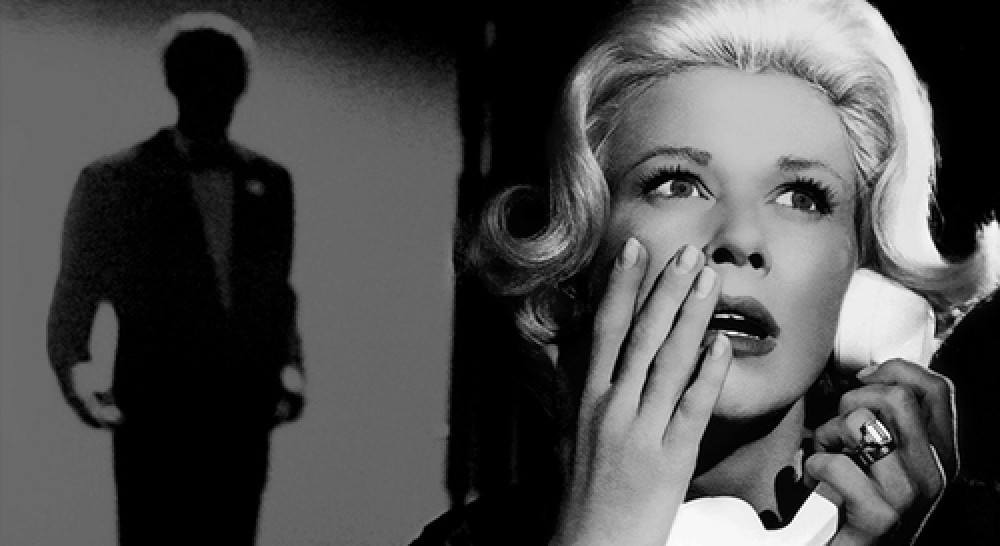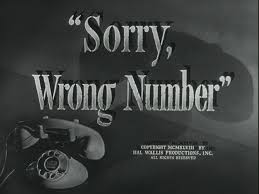 Sadly, due to technical difficulties, we were unable to screen the advertised film, Uncle Silas. Instead, we watched another woman in peril film Sorry, Wrong Number (1948, Anatole Litvak, 88 mins). This starred Barbara Stanwyck as bedridden ‘cardiac neurotic’ Leona and Burt Lancaster as her husband, Henry Stevenson. Superficially the film may not seem to have much in common with our focus on the Gothic theme other than it centring on a woman in peril. However, our discussion noted the significance of several large shadowy houses/apartments and Leona and another female character turning into investigators. We also spoke about how Leona was similar to, and different from, her fellow female Gothic investigators. There was discussion on the film’s radio play origins and the ways in which the film padded out two almost 3 times the radio play’s length and its extensive, and sometimes nested, use of Flashbacks. The ways in which the film widened out the narrative from a prime focus on Leona and fleshes out is characters and their motivations were also commented on. This allowed for us to usefully compare and contrast Sorry, Wrong Number’s central couple to the de Winters in Rebecca. Finally we noted more traditionally filmic devices such as the Flashback and Montage, and the significance of the telephone in relation to cinema.
Sadly, due to technical difficulties, we were unable to screen the advertised film, Uncle Silas. Instead, we watched another woman in peril film Sorry, Wrong Number (1948, Anatole Litvak, 88 mins). This starred Barbara Stanwyck as bedridden ‘cardiac neurotic’ Leona and Burt Lancaster as her husband, Henry Stevenson. Superficially the film may not seem to have much in common with our focus on the Gothic theme other than it centring on a woman in peril. However, our discussion noted the significance of several large shadowy houses/apartments and Leona and another female character turning into investigators. We also spoke about how Leona was similar to, and different from, her fellow female Gothic investigators. There was discussion on the film’s radio play origins and the ways in which the film padded out two almost 3 times the radio play’s length and its extensive, and sometimes nested, use of Flashbacks. The ways in which the film widened out the narrative from a prime focus on Leona and fleshes out is characters and their motivations were also commented on. This allowed for us to usefully compare and contrast Sorry, Wrong Number’s central couple to the de Winters in Rebecca. Finally we noted more traditionally filmic devices such as the Flashback and Montage, and the significance of the telephone in relation to cinema.
After the brief opening which combines dramatic text about the ‘horror’ of the telephone and shots of operators busily connecting people which establishes the importance of telephones to the film’s plot, we are afforded our first view of Stanwyck. Bedridden Leona is telephoning her husband’s office in an apartment which increasingly becomes full of shadows and suspense as she overhears a murder plot through a crossed wire. In addition to the large New York apartment Leona is confined to in the ‘present’ of the film we discussed other more Gothic spaces. A large empty 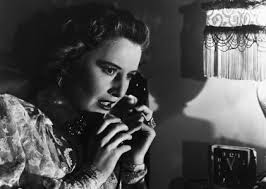 beach house is the focus of Leona’s husband’s criminal activities, while Leona’s childhood home, a Chicago mansion full of dark furniture, large hanging portraits, also appears. The latter is the setting for some of Leona’s moments of hysteria which comment on her odd relationship with her father, including accusations he wants to keep her all to himself.
beach house is the focus of Leona’s husband’s criminal activities, while Leona’s childhood home, a Chicago mansion full of dark furniture, large hanging portraits, also appears. The latter is the setting for some of Leona’s moments of hysteria which comment on her odd relationship with her father, including accusations he wants to keep her all to himself.
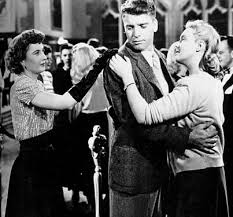 Due to Leona’s restrictions, she relies on the telephone to access information for her investigations. These begin with her search for her husband which leads her to telephone her husband’s secretary. Leona is furnished with information about a woman who has visited her husband at his office. This is Sally Hunter – who it is revealed was Leona’s ‘friend’ and her husband’s girlfriend before Leona stole him away. Significantly it is Sally who provides Leona with much of the information on the former’s husband’s investigation into the latter’s criminal activities. We see Sally visiting the beach, though not entering the beach house so we are denied shots of her investigating the dark space.
Due to Leona’s restrictions, she relies on the telephone to access information for her investigations. These begin with her search for her husband which leads her to telephone her husband’s secretary. Leona is furnished with information about a woman who has visited her husband at his office. This is Sally Hunter – who it is revealed was Leona’s ‘friend’ and her husband’s girlfriend before Leona stole him away. Significantly it is Sally who provides Leona with much of the information on the former’s husband’s investigation into the latter’s criminal activities. We see Sally visiting the beach, though not entering the beach house so we are denied shots of her investigating the dark space.
In addition to acting as an enabler for Leona’s investigative interests (even though these are set in the past) Sally doubles Leona in other ways. She is her rival in love and both are interested in the investigation due to their concern for Henry. Sally also suffers in ways we can compare to Leona. Although she is not physically restricted, the bonds of marriage and motherhood are clearly shown. Sally’s husband assumes his wife is responsible for the fact their child is out of bed late and night and expects her to provide him and his friends with beers. These restrictions even lead to her being tortured, like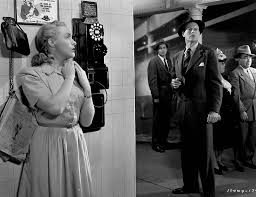 Leona, by telephones – though to a lesser extent. This is in terms of access as she chases around the city moving from her home to a drugstore so she can discuss the case with Leona openly, and when the drugstore closes to a telephone at a busy and noisy station. This also succeeds in torturing Leona and the audience as we only find our information as Leona does and this is enacted in Flashbacks.
Leona, by telephones – though to a lesser extent. This is in terms of access as she chases around the city moving from her home to a drugstore so she can discuss the case with Leona openly, and when the drugstore closes to a telephone at a busy and noisy station. This also succeeds in torturing Leona and the audience as we only find our information as Leona does and this is enacted in Flashbacks.
Notably not even Sally knows much about the investigation which furthers the suspense. Leona has to rely on a chance phone call from a man – a chemist at her father’s pharmaceutical business who reveals he was her husband’s partner in crime. The calm Waldo Evans politely and slowly reveals the situation to Leona. Evans’ composure is effectively contrasted to Leona’s increasing hysteria – when it gradually becomes clear that she is the planned murder victim of the overheard telephone call.
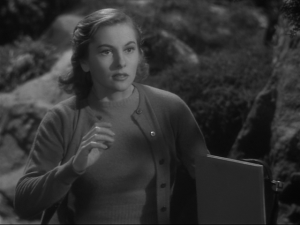 Leona’s passive receiving of information prompted us to consider other ways in which she differs to more obviously Gothic heroines. While the second Mrs de Winter is hardly an active investigator, her questioning of various people and her physical movement through space sharply contrasts to Leona’s. They are also very different in terms of the sympathy they might elicit from the audience. The second Mrs de Winter is in many ways childlike in her innocence. Leona also exhibits childlike characteristics but these are of a spoilt child not one who needs protecting but one who tramples on others to get what she wants. We might feel some sympathy for Leona in the desperate declaration of her love for her husband and her final fate, but she is fundamentally dislikeable – especially when compared to her double, Sally, whom she has treated very badly. It was noted that Leona is similar in some ways to the second Mrs de Winter’s vulgar employer Mrs Van Hopper. Both women are predatory towards the main male character in their respective films. This also extends to scenes set in each woman’s bedroom with both confined to bed by illness and wearing nightgowns. While costume aligns Leona with Mrs Van Hopper it also separates her from the second Mrs de Winter and in Sorry, Wrong Number from Sally. Leona is always exquisitely dressed but the second Mrs de Winter and Sally are less expensively attired.
Leona’s passive receiving of information prompted us to consider other ways in which she differs to more obviously Gothic heroines. While the second Mrs de Winter is hardly an active investigator, her questioning of various people and her physical movement through space sharply contrasts to Leona’s. They are also very different in terms of the sympathy they might elicit from the audience. The second Mrs de Winter is in many ways childlike in her innocence. Leona also exhibits childlike characteristics but these are of a spoilt child not one who needs protecting but one who tramples on others to get what she wants. We might feel some sympathy for Leona in the desperate declaration of her love for her husband and her final fate, but she is fundamentally dislikeable – especially when compared to her double, Sally, whom she has treated very badly. It was noted that Leona is similar in some ways to the second Mrs de Winter’s vulgar employer Mrs Van Hopper. Both women are predatory towards the main male character in their respective films. This also extends to scenes set in each woman’s bedroom with both confined to bed by illness and wearing nightgowns. While costume aligns Leona with Mrs Van Hopper it also separates her from the second Mrs de Winter and in Sorry, Wrong Number from Sally. Leona is always exquisitely dressed but the second Mrs de Winter and Sally are less expensively attired.
Furthermore both main female characters 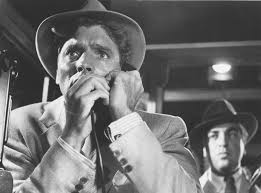 in Sorry, Wrong Number and Rebecca seem morally unambiguous. Leona is dislikeable and plotting in nature. This was perhaps necessary to allow for her to be killed in the era of the Production Code, with the murder itself also a central part of the ‘famous’ radio play the film references in its credits. The second Mrs de Winter is innocent and likeable. However the men in both films are morally murky. Indeed both Henry and Maxim are painted fairly sympathetically as victims of either a demanding wife and threatening associates or a philandering wife. The couple of Sorry, Wrong Number can be contrasted to Rebecca. While Maxim was a threat to his first wife it seems unlikely he will harm his second, while much of the threat to Leona stems from her husband’s inaction in not stopping his associates rather than deliberate plotting on his part. We found it especially interesting that while part of Leona’s medical condition – her cardiac neurosis – is in effect hysteria causing her to think she has heart problems she is also facing a very real threat which her condition, and her behaviour, has made her vulnerable to. By contrast, the second Mrs de Winter’s fears are shown to be entirely justified, though not in danger, when it is revealed her husband killed his late wife.
in Sorry, Wrong Number and Rebecca seem morally unambiguous. Leona is dislikeable and plotting in nature. This was perhaps necessary to allow for her to be killed in the era of the Production Code, with the murder itself also a central part of the ‘famous’ radio play the film references in its credits. The second Mrs de Winter is innocent and likeable. However the men in both films are morally murky. Indeed both Henry and Maxim are painted fairly sympathetically as victims of either a demanding wife and threatening associates or a philandering wife. The couple of Sorry, Wrong Number can be contrasted to Rebecca. While Maxim was a threat to his first wife it seems unlikely he will harm his second, while much of the threat to Leona stems from her husband’s inaction in not stopping his associates rather than deliberate plotting on his part. We found it especially interesting that while part of Leona’s medical condition – her cardiac neurosis – is in effect hysteria causing her to think she has heart problems she is also facing a very real threat which her condition, and her behaviour, has made her vulnerable to. By contrast, the second Mrs de Winter’s fears are shown to be entirely justified, though not in danger, when it is revealed her husband killed his late wife.
The fleshing out of characters, especially Henry, contrasts to the radio play. Also notably different is the use of extensive, at times nested, Flashbacks which certainly aids the rounding out of the characters. But it also breaks up the suspense to a large extent – rather than 30 minutes of mounting hysteria the back and forth and the pacing suggests a more rhythmic melodrama. Rhythm was also seen in montages where it served a different purpose. Most notably to this conveyed Leona and Henry’s progressing relationship as they visited several countries on their honeymoon and Leona increasingly treated Henry with cool disdain as she controlled his behaviour and kept a physical distance.
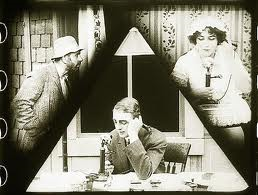 The centrality of telephones to the narrative prompted comment as to its use as a device in the film as well as its wider significance. Even before we see any characters the evils of the telephone are described in terms of bringing ‘horror’ to some people. We discussed the telephone’s ability to simultaneously bring people together in terms of audio and to emphasise geographical distance. This is explicitly commented on when Henry (wrongly) reassures a frightened Leona that she is the middle of New York with a phone by her bed and therefore not in any danger. We noted that this served as a metaphor for cinema – while we can see and hear characters’ lives being played out we are unable to intervene. We mentioned earlier examples focusing on the telephone. These included a French one-handed play in which the only character has to listen on the phone as his wife is attacked, D. W. Griffith’s The Lonely Villa (1909), and Lois Weber’s Suspense (1913) in which similar situations, but with happier outcomes, occur.
The centrality of telephones to the narrative prompted comment as to its use as a device in the film as well as its wider significance. Even before we see any characters the evils of the telephone are described in terms of bringing ‘horror’ to some people. We discussed the telephone’s ability to simultaneously bring people together in terms of audio and to emphasise geographical distance. This is explicitly commented on when Henry (wrongly) reassures a frightened Leona that she is the middle of New York with a phone by her bed and therefore not in any danger. We noted that this served as a metaphor for cinema – while we can see and hear characters’ lives being played out we are unable to intervene. We mentioned earlier examples focusing on the telephone. These included a French one-handed play in which the only character has to listen on the phone as his wife is attacked, D. W. Griffith’s The Lonely Villa (1909), and Lois Weber’s Suspense (1913) in which similar situations, but with happier outcomes, occur.
(You can see more on The Lonely Villa and Suspense from earlier blog discussions: http://blogs.kent.ac.uk/melodramaresearchgroup/2013/05/12/melodrama-screening-and-discussion-15th-may-jarman-7-4-7pm/ and http://blogs.kent.ac.uk/melodramaresearchgroup/2013/05/16/summary-of-discussion-on-early-film-melodrama-shorts/)
Of course Sorry, Wrong Number contrasts to these in that the worried husband is, if only indirectly, responsible for the wife’s attack, further highlighting the ambiguity of the male character.
We also discussed Leona’s disability in terms of our next screening, The Spiral Staircase (1945). Both women are also disabled in their passivity – being female appears to be another disability.
As ever, do log in to comment, or email me on sp458@kent.ac.uk to add your thoughts.
And do check out some fascinating Fan and Trade Magazine materials relating to the film on the wonderful Network of Research: Movies, Magazines, Audiences (NoRMMA) blog: http://www.normmanetwork.com/?p=249
Sorry, Wrong Number Links
Film Trailer: https://www.youtube.com/watch?v=5LMZcFMRV5o
The original radio play: https://archive.org/details/Suspense430525SorryWrongNumberWestCoast
The Stanwyck radio remake for Lux radio: https://www.youtube.com/watch?v=gIbcJxQukO4
Jack Benny’s take on the film:
https://archive.org/details/JackBennyProgram481017SorryWrongNumber
